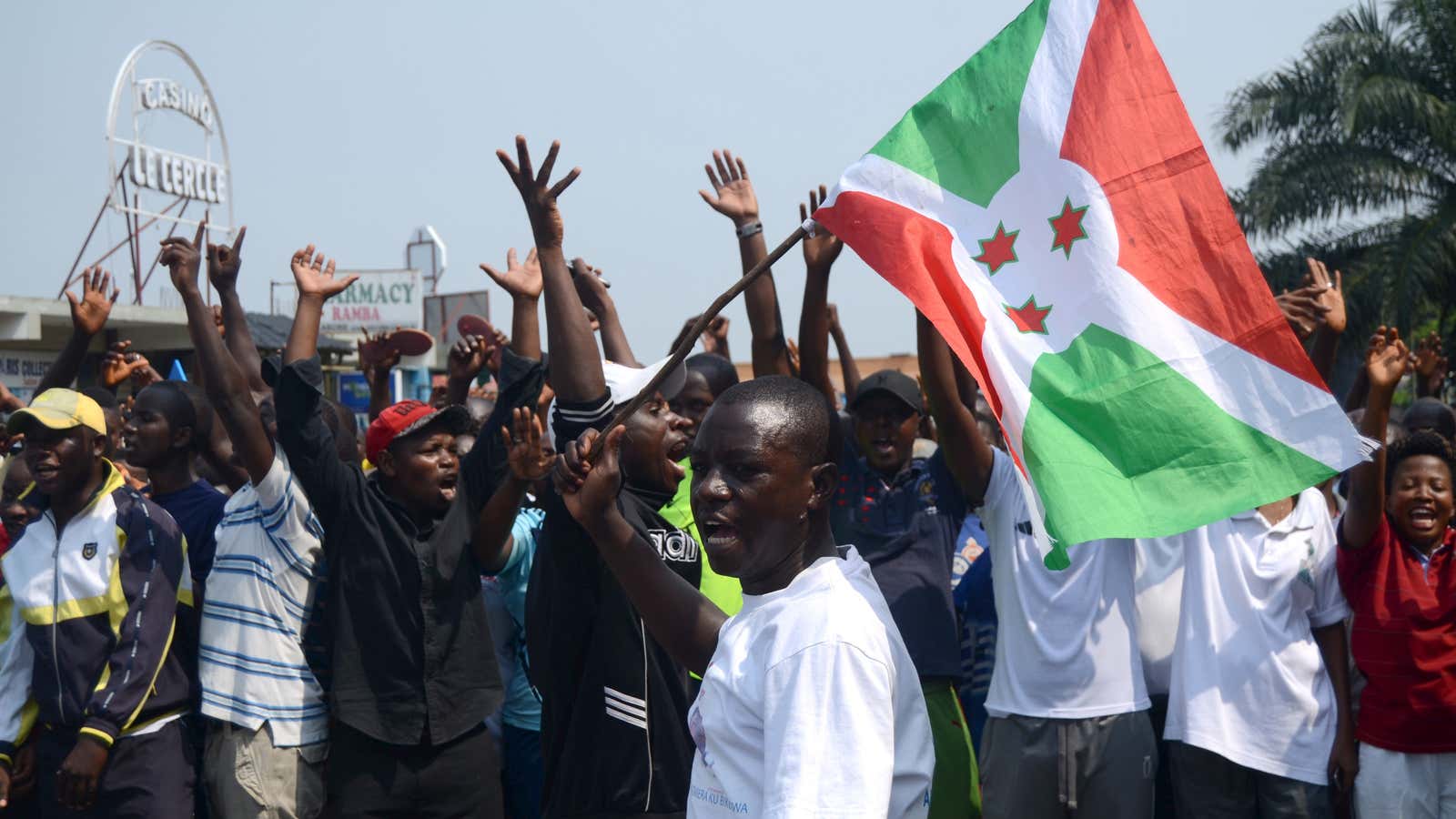Bujumbura, Burundi
Ten months after Burundian authorities set fire to radio broadcasters in the capital Bujumbura, residents walk by the torched radio stations, necks craned over smart phones, scrolling Twitter, Facebook, and WhatsApp for news about the explosions in the center of town.
As international journalists and police arrive on the scene the founder and main reporter for the Facebook page, SOS Medias Burundi, is already walking away. “W.K.”—who has asked Quartz to use that moniker to allow him operate freely in Bujumbura—is uploading photos on one phone and getting comment from the police commissioner on the other. A third phone rings in his pocket, a contact calling to schedule an interview with a victim of police torture.
W.K. spends most of his days reporting in Bujumbura—without pay—at a dizzying pace.
Months after a coup attempt and street protests failed to prevent president Pierre Nkurunziza’s violent consolidation of power, news-starved Burundians rely on social media as a lifeline for news and information about family members who have been arrested, disappeared, or killed.
The bruising crackdown on local media gave way to a culture of rumor and fear, two men and their teams of out-of-work journalists and street-level informants have taken to social media, at huge risk to their personal safety, in order to keep Burundians—at-home and in-exile—and the international community informed.
The founders of SOS Medias Burundi—originally more of an underground radio broadcaster—quickly realized they needed to combat the misinformation on social media with a Facebook-based outlet offering verified news.
“All of us were discouraged by this, asking ‘Is this the end of true journalism in Burundi?’” says W.K., 35.
SOS Medias operates in a social media environment with old-school news principles. They host editorial meetings on WhatsApp, dole out assignments, and tirelessly verify information before posting on Facebook and Twitter. For them, providing an alternative to the rumor mill is paramount.
“We saw people were trusting so much in social media even as they’re consuming lies and rumor on social media, so we decided to put something in place where they already were. What you’ll get at SOS: no propaganda, no rumors, no support of opposition or government. We do our job,” says W.K.
Along with the other editors, he coordinates posts with over 100 field reporters that the group relies on for fresh news on the crisis but also vital information on floods, traffic incidents, from around the country.
For Teddy Mazina, the crisis that has brought so many Burundians online, transformed him from a photographer to more of an activist.
“It’s a total blackout. The struggle, the fight is to break the silence to keep talking about Burundi, to keep showing what’s going on,” says Mazina, who has over 23,000 combined Twitter and Facebook followers.
His family is in hiding in one country and he has fled to another, setting up his Twitter headquarters in a sparse one-bedroom apartment in an unoccupied building. There are two large monitors and a couch— the Mazina newsroom, he jokes—and he and one friend rotate 12-hour sleeping-and-tweeting shifts to keep the information flowing.
“When people get arrested or disappeared, you post their photo, share with friends, tagging the East African presidents on Twitter, tagging UN officials, it ends up in the hands of the government,” Mazina says, explaining one Twitter activism strategy.
“Sometimes we get lucky and people are taken from hidden intelligence sites, where they [are often] killed, to central prison. It puts a kind of pressure on the government.”
Both Mazina and W.K. acknowledge the risk their online presence poses to themselves and their families.
“You never choose to be in this kind of situation. I have threatening messages from members of the ruling party, that they’ll kill me,” says Mazina, but adds, “If there was no social media this government would have killed thousands and nobody would know. We have to make sure there is at least evidence.”
For W.K., joining the more than 100 Burundian journalists who have recently fled to neighboring countries is not an option.
“On the ground, we do get harassed by guys from intelligence and the police. They tell me they can kill me,” he says.
“But I’m just doing my job. I’m not paid but I think, ‘Burundi is being destroyed by its own children now, but this country gave me so much. So I’ll keep working until the day it will be impossible.”
